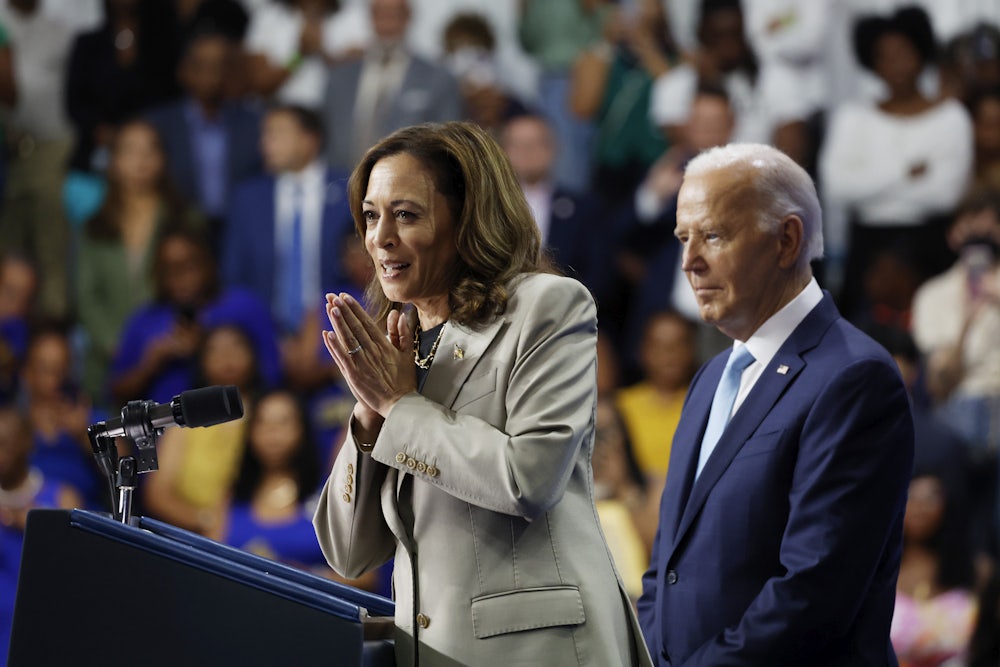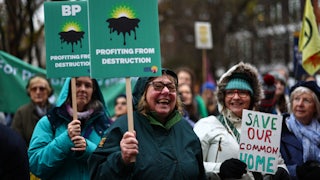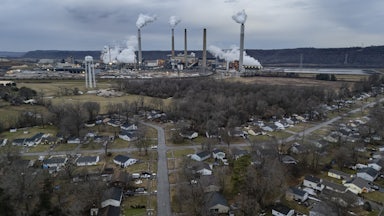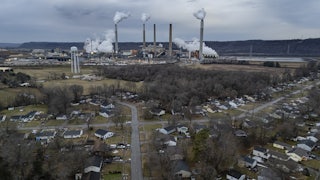Hardly a day goes by without a massive tech company rolling out a new sustainability initiative—or whatever it is you’d like to call Microsoft restarting the Three Mile Island nuclear facility and Amazon’s announcement on Tuesday that it’ll build small modular nuclear reactors. As Silicon Valley comes under pressure to reduce the emissions footprint of its ever-growing fleet of power-hungry data centers—exacerbated by its rush into artificial intelligence—tech companies have also broadcast their support for a climate tool that’s taken something of a beating in recent years: carbon markets.
During Climate Week last month, the LEAF Coalition—a project spearheaded by Amazon, with support from the U.S. and U.K governments—announced an agreement with the Brazilian state of Pará to purchase $180 million worth of carbon-offset credits. Under the agreement, Amazon and five other U.S.-based companies will purchase credits that correspond to emissions reductions in the Amazonian rainforest in order to offset their own emissions at home. Senior White House adviser John Podesta praised the arrangement during a keynote at an emissions-trading industry conference that same week, noting that he’d attended a celebration of it the night before with representatives from project leads Amazon and Emergen, as well as Pará’s Indigenous communities.
“Native people are often the best stewards of nature and the most impacted when it’s destroyed,” Podesta said. “We can do this. We can reduce and remove carbon from land use, not just in the Brazilian Amazon but around the world. And we can use carbon markets to channel funds where they’re most needed and benefit vulnerable and Indigenous communities,” he added, calling the project a “fantastic example” of what a well-functioning carbon market can look like. “We need literally thousands of those.”
A few days later, 35 Indigenous and community organizations in Pará denounced the deal and said they had not been consulted before it was signed in New York. The groups contend that it represents a “clear violation” of the internationally recognized principle of Free Prior and Informed Consent, or FPIC, established to ensure that Indigenous peoples and traditional communities are consulted in good faith, autonomously, and without coercion before the implementation of projects that might impact them. “Advocating for the defense of the environment—whether physical, cultural, or spiritual—cannot be treated as bargaining chips,” their letter reads, “for the commercialization of carbon credits.” On Tuesday, Pará officials said they will “begin a new phase of dialogue” and consult with Indigenous communities over how they’ll benefit from carbon-offset sales. (While the deal was signed in late September, the transactions are due to be finalized in 2025.)
The episode highlights broader issues with carbon markets, a tool that both tech companies and the White House continue to champion despite numerous scandals: They’re not very good at the one thing they are ostensibly meant to do—reducing emissions. The Harris campaign hasn’t given much of an indication as to how her administration would relate to carbon markets and deals like the one in Pará, although her public embrace of the tech sector might suggest that—as on other policy fronts—she’ll continue the current administration’s approach.
The continued interest in carbon markets is somewhat surprising given just how many hits their reputation has taken in recent years. Carbon Brief last year published an exhaustive roundup of the controversies surrounding the voluntary carbon market, i.e., those that exist outside of government programs such as California’s cap-and-trade system or the European Union’s emissions-trading system. The voluntary market consists of companies, often major polluters like Shell and Volkswagen, purchasing credits that correspond to emissions reductions elsewhere, usually in the global south. Problems with that model have included displacement and the disruption of Indigenous ways of life, as well as fundamental accounting errors; one study estimates that just 12 percent “of the total volume of existing credits constitute real emissions reductions.”
This has been a particular problem for forest carbon offsets of the sort being traded through the LEAF Coalition’s new initiative. Many of those issues stem from the concept of additionality: the idea that the carbon credits correspond to emissions reductions that wouldn’t happen otherwise. When credits are meant to preserve land, it can be difficult to prove whether forests whose preservation is financed by carbon credits were actually in danger of being razed—or if credits funneled money to preservation that would have happened anyway. Additionality is meant to be verified by third parties, but those parties have suffered their own scandals in recent years. A 2023 investigation by The Guardian, the German outlet Die Zeit, and a nonprofit newsroom called SourceMaterial looked into the credits verified by the Verified Carbon Standard, administered by the nongovernmental organization Verra. It found that at least 90 percent of VCS-approved credits generated in the rainforest—purchased by brands like Disney and Gucci—were worthless “phantom credits” that didn’t correspond to any reductions. (Verra has disputed these allegations.)
Another problem with carbon-offset credits is more fundamental. While carbon emissions can stay in the atmosphere for tens of thousands of years, there’s no way to guarantee that the trees used to “offset” those emissions will stay standing indefinitely. “Almost all of these carbon crediting contracts are for years or decades. The longest I’ve seen is for 100 years,” says environmental economist Danny Cullenward, a senior fellow at the University of Pennsylvania’s Kleinman Center for Energy Policy, whose research focuses on carbon offsets and storage. “That’s not at all comparable. It’s a tough issue, and commercial practice in most sectors, including forestry, really isn’t getting close to physical reality.”
As temperatures continue rising, moreover, the planet’s so-called “carbon sinks” are breaking down. Preliminary research recently found that the earth’s forests, plants, and soils absorbed almost no carbon in 2023, temporarily collapsing thanks to climate-fueled pressures like droughts and wildfires. These changes could be temporary, but researchers warn that a failure to prevent further warming could mean that carbon sinks “no longer provide to humanity the mitigation service they have offered so far by absorbing half of human induced CO2 emissions.” Pará saw record-setting wildfires this year, fueled both by climate change and by land grabs and illegal mining operations. The credits to be generated there via the LEAF Coalition’s plan have yet to receive approval from a third-party verifier, the Architecture for REDD+ Transactions, or Art Trees. So while those credits aren’t currently going up in smoke, it’s not clear how safe LEAF Coalition–protected forests will be from future blazes. “If the forest catches on fire, the carbon that has been absorbed goes right back into the atmosphere,” Shigueo Watanabe Jr. of the Talanoa Institute, a Brazilian think tank dedicated to climate policy, told Mongabay this month. “But the companies that are buying that credit have already polluted. If their carbon credit goes up in smoke, they now owe humanity.”
In championing carbon offsets, White House officials have emphasized the importance of ensuring their integrity. “High-integrity carbon markets,” Podesta said at the emissions-trading conference, can “help accelerate our progress toward a net-zero world. But only if we get them right. They need to represent real, additional, permanent emissions reductions and avoid leakage.”
Deputy Treasury Secretary Wally Adeyemo—reportedly in the running to take over the top job there if Harris is elected—echoed that sentiment at another Climate Week event where he filled in for Janet Yellen. Voluntary carbon markets “have the potential to create both economic and climate opportunities,” he said. “But today’s markets face significant challenges that are holding back their growth.” In May, the Treasury Department introduced principles designed to help create these “high-integrity” markets; the Commodity Futures Trading Commission recently finalized its own guidance for carbon-offset markets.
Cullenward sees a lot to like about these efforts. “They point to a lot of the right things,” he told me over the phone this week. But those principles don’t “speak to the gap that’s been present for decades, which is that everyone says they’re going to deliver additionality and no one does, and there are never any consequences.” The Treasury Department’s principles, for instance, note that one element of carbon market integrity is to ensure that they create permanent greenhouse gas benefits for a “specified period of time,” without specifying how long that should be. “There’s lots of good words and aspirations,” Cullenward says. “But the problem has always been accountability—not chanting the right words.”
On that front, he was surprised and cautiously optimistic about the Justice Department’s recent announcement that it’s bringing criminal fraud charges against carbon marketeer and onetime Verra board member Kenneth Newcomb. Newcomb was indicted earlier this month for leading a multiyear scheme that falsified information on the greenhouse gas emissions reductions generated by cooking stove projects in Africa and Southeast Asia, using inflated numbers to attract more than $100 million worth of investments to his firm, C-Quest. Those first-of-their-kind charges could signal a newfound commitment to accountability in carbon markets on the part of the United States, or even a prospective Harris administration. For now, though, the White House’s enthusiasm for voluntary carbon markets—as a tool for padding tech companies’ reputations, especially—seems to dodge the larger existential questions that continue to plague this favorite “fix.”








